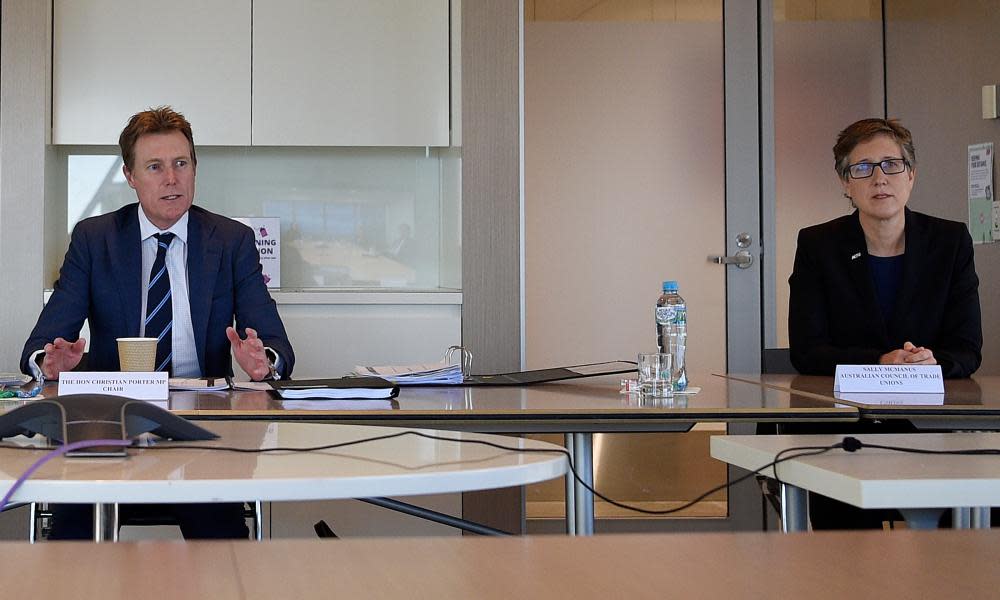Scott Morrison's call for Australia to renovate won't rebuild a broken economy

On Wednesday, Australia’s Liberal treasurer, Josh Frydenberg, acknowledged Australia is in economic recession. The economy shrunk by 0.3% in the March quarter. June is expected to be worse. It’s our first acknowledged recession in 29 years.
The situation is unsurprising. Earlier in the year, Australia had to contend with the destruction and expense of summer’s devastating fires. Then it felt the impact of the coronavirus lockdown, with its fallout of suspended activity, lost jobs and changed consumer spending priorities.
And it’s going to get worse. The Age reports that economists, the Treasury and the Reserve Bank are “resigned to the June quarter showing the economy experiencing its worst three-month period since the 1930s”.
Related: Yes, Australia is in a recession – but worse is yet to come | Greg Jericho
That’s not a period of which Australia, in any way, should wish to be reminded. During the Great Depression, unemployment in Australia hit a staggering 32%. The only country to supersede this index of misery – fatefully – was Germany.
And yet there are features of that awful time that have disturbing parallels to now. Firstly, there were structural problems in our economy pre-existing the onset of external disaster. Before the last election, statistics were sounding loud alarms about instabilities fomented by government policy inaction. A year ago there was already a retail slump, attributed to ongoing low wage growth. Indicators like a 16% drop in first-homebuyer loans and a 7.9% drop in new vehicle sales were read as a “warning sign of impending [economic] doom”.
It’s unfortunate that a pre-election declaration by the Australian Bureau of Statistics chief economist that “soft household spending” lay underneath Australia entering “a per capita recession” weren’t heeded at the time. Because the second sad parallel of the Depression-era past to now is that Australia has a government ideologically ill-equipped to manage the crisis.
It’s the Liberal-Nationals’ committed neoliberal policy habit of low-wage labour exploitation that has eroded spending capacity within the economy. The tracts of Milton Friedman have been literally gripped to the chest of Morrison’s parliamentarians as they’ve made business-generous “trickle-down” economic decision-making flow. Alas, the free-market-purist logic of allowing people to just – y’know – die in the service of economic growth turned out to be unpopular when government-friendly stalking horses gave this idea their best neigh in the media.
Morrison – brand-damaged by his Waikiki vacation and stumbling clown act in the bushfires – has been obliged by the shocked new recruits to Centrelink queues to pivot beyond neoliberal business as usual. Hence the unexpected, apparent glasnost between the hardline, neoliberal front of Morrison’s boyos with their long-chosen enemy, the trade union movement.
What a spectacle it is to see a neocon IR minister, Christian Porter, now desperate as a teenager before a dance to claim an iron socialist like the ACTU’s Sally McManus is his “new BFF”, despite her conspicuous refusal to do the same. The Liberal leadership have realised that only the application of Depression-ending Keynesian economic strategies can ameliorate their vulnerable political situation. They’re trying to glean economic concepts and grab some policy ideas from McManus and the unions because they cannot risk elevating and vindicating parliamentary Labor’s own Keynesians in the public policy conversation. Nor can the Liberals do nothing – they’d just cede an economic leadership platform to Labor’s Anthony Albanese.
This was the framework that informed the creation of jobkeeper – the income subsidy that originated from explicit union demands. Yet despite the government’s rush to consult McManus, like any inauthentic contribution to a project, the Liberals’ fundamental disbelief in the politics of a subsidy have warped its design. Jobkeeper has been slow to start, cumbersome to access, has not helped all those who needed help and is contributing to unemployment as opportunistic businesses exploit staff on the subsidy rather than create new jobs to meet demands.
Related: The homebuilder scheme is simply pork-barrelling to the Coalition's electoral base | Emma Dawson
So too have union demands for local procurement and investment in paid local jobs been contorted into the government’s unhinged “home improvement” stimulus scheme. A real “tradie-led” economic recovery would entail restarting government departments of public works and committing to the great projects of infrastructure-building with which the Curtin-Chifley Labor governments of the 1940s rebuilt Australia in the wake of the Depression and the second world war. This country is crying out for public housing, among many other things – but state enterprise and public services are anathema to the neoliberal DNA. Instead, Scott Morrison’s bizarre cash grants for home improvements have the conditions and restrictions of a wine club discount voucher where you have to buy more of what you don’t want at a price you can’t afford before the savings kick in at all.
Despite everything, the Liberals have continued their sabre-rattling at unions, repeating ancient threats of further “IR reform”, and a cartoon appeared the other day depicting the union negotiations with Morrison as the allegorical scorpion asking for a ride from a frog in a union T-shirt.
Given that the unions have presently negotiated Morrison’s government into progress on their demands, the removal of the union-busting “Ensuring Integrity” legislation and vindication of their most fundamental economic politics, I’d politely suggest that the famously birdwatching McManus is more sensibly depicted as an owl.
Owls have long memories. They hunt moving targets. Oh, and owls eat scorpions - don’t you know?
• Van Badham is a Guardian Australia columnist

 Yahoo News
Yahoo News 
